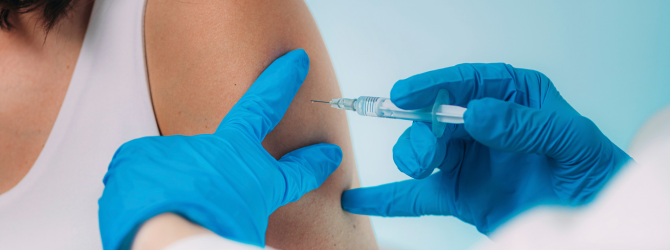A Shot for a Safer Future: Understanding Hepatitis B Immunisation
World Immunisation Week is a significant event on the global health calendar, highlighting the importance of vaccination in preventing diseases and promoting overall wellbeing. Among the vaccines that play a crucial role in safeguarding public health is the hepatitis B vaccine. Find out why the hepatitis B vaccine matters, its impact on global health, and why it’s essential to prioritise immunisation during World Immunisation Week and beyond.
What is hepatitis B?
Hepatitis B is a viral infection that affects the liver, causing inflammation and potentially leading to severe complications such as liver cirrhosis and liver cancer. The virus is transmitted through contact with infected blood or body fluids, including sexual contact, sharing of needles, and from a mother with chronic hepatitis B to a child during childbirth. However, the good news is that hepatitis B is preventable through vaccination.
What is the hepatitis B vaccine?
The hepatitis B vaccine has been available for several decades and is highly effective in preventing the virus. It works by stimulating the body’s immune system to produce antibodies against the hepatitis B virus, providing long-term protection against infection. The vaccine is typically administered in a series of doses, with the full course providing robust immunity.

Who should get vaccinated for hepatitis B?
Anyone who wants to protect themselves against hepatitis B can talk to their doctor about getting vaccinated.
Hepatitis B vaccination is highly recommended for high-risk groups, including:
- • infants
- • Aboriginal and Torres Strait Islander people
- • those who are immunocompromised
- • people with medical risk factors
- • people with jobs that put them at higher risk of exposure
- • travellers heading to areas where hepatitis B is common
- • people whose circumstances increase their likelihood of hepatitis B (e.g. having a partner with hepatitis B, injecting drug use)
Under the National Immunisation Program, the hepatitis B vaccine is free for babies within 7 days of being born, and for children at 2 months, 4 months, and 6 months old. Additionally, those under 20 years old who missed out on vaccination and refugees and humanitarian entrants of any age can also get a catch-up vaccination for free, if recommended.
How do you get the hepatitis B vaccination?
You can book a vaccine appointment at a range of health services including:
- • your doctor (GP)
- • local council immunisation clinics
- • community health centres
- • Aboriginal Medical Services
- • pharmacies
- • schools (for adolescents).
What are the side effects?
You might experience some minor side effects after receiving a vaccination. These reactions are usually mild and short-lived, lasting no more than a couple of days. In most cases, you’ll recover without any issues.
Common side effects of hepatitis B vaccines include pain, redness, and swelling at the injection site. Occasionally, you may also notice a lump at the injection site, which can last for several weeks, though it typically doesn’t require any treatment. Some people may also experience a mild fever.
If you have any concerns about the possible side effects of hepatitis B vaccines, or if you or your child experience side effects that worry you, don’t hesitate to talk to your vaccination provider. They can provide you with more information and address any concerns you may have.
World Immunisation Week
World Immunisation Week serves as a timely reminder of the importance of vaccination in protecting individuals and communities from vaccine-preventable diseases like hepatitis B. It’s an opportunity to raise awareness about the availability and benefits of vaccines, debunk myths and misinformation, and encourage people to stay up to date with their immunisations.
By supporting vaccination programs, advocating for equitable access to vaccines, and addressing barriers to immunisation, we can work towards a world where preventable diseases like hepatitis B are a thing of the past.
Take the step to protect yourself and your community—get vaccinated today.
